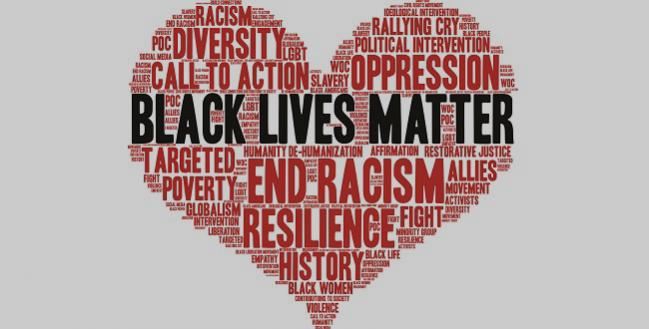Cardiology Societies Unite to Condemn Racism and Health Inequality
The groups also voiced their concerns about the cardiovascular consequences of psychosocial stress during turbulent times.

(UPDATED) The Association of Black Cardiologists (ABC), the American Heart Association (AHA), and the American College of Cardiology (ACC) issued a joint letter over the weekend condemning acts of violence and racism, and voicing concern about the cardiovascular toll associated with grief and stress. Additionally, the AHA issued a separate statement urging changes in healthcare policy to improve the lives of black Americans.
“Medical organizations, particularly cardiovascular ones, must speak out because racial discrimination results in poor cardiovascular health and limits access to medical care," ABC President Michelle A. Albert, MD, MPH (University of California at San Francisco), said in an email to TCTMD.
During a weekend that saw peaceful protests over the death of 46-year-old George Floyd—a Minnesota man intentionally pinned beneath the knee of a police officer until he could no longer breathe—as well eruptions of violence and looting in major US cities, the three societies said they stand in solidarity with efforts “to dismantle systems that maintain excess morbidity and mortality especially among vulnerable populations and those historically oppressed.”
#CardioTwitter applauded the societies for speaking out.
These acts of violence and racism need to stop. Thank you for supporting the Association of Black Cardiologists! @MayoClinicCV https://t.co/1coju3WGfa
— Mayra Guerrero, MD (@MayraGuerreroMD) May 31, 2020
Among the concerns is that recent violent racial incidents in the United States—Floyd’s death on the heels of the killings of Ahmaud Arbery in Georgia and Breonna Taylor in Kentucky, among others—have profound consequences for people of color that can contribute significantly to their CVD risk.
We're acknowledging that stress is a risk factor for cardiovascular disease, and if racism doesn't cause us stress, I don't know what does. Cheryl Pegus
Commenting to TCTMD, Cheryl Pegus, MD, MPH (Cambia Health Solutions, Portland, OR), immediate-past chair of the ABC, noted that the stressors created by ongoing protests and tensions can manifest in many different ways, including by “weathering,” a phenomenon through which physical health deteriorates in relation to cumulative exposure to the stress posed by socioeconomic disadvantage and discrimination.
Thank you @ACCinTouch @athenapoppas for demonstrating leadership during these difficult times and joining with @ABCardio1 and @American_Heart to denounce racism and violence that lead to increased risk of death and adverse health outcomes in our minority populations. https://t.co/bbqZgQ2IQE
— Benjamin Galper (@BGalperMD) May 31, 2020
“We're acknowledging that stress is a risk factor for cardiovascular disease, and if racism doesn't cause us stress, I don't know what does,” she said.
Mitigating ‘Unacceptable Disparities’
In the joint letter, the three societies note that “it is crucial, now more than ever, that our efforts help to mitigate the unacceptable disparities among our most vulnerable populations. We have the unprecedented opportunity to address these issues through policy and by working with affected communities and the healthcare providers who serve them.”
The AHA, in their individual statement, further contend that “deep societal ills are hurting the hearts of black men and women in our nation.” They add that the AHA has made the pursuit of health equity a priority through such things as investing in social entrepreneurs “to confront the challenge of food deserts on the south side of Chicago” and “by advocating in Washington and state capitols for public policy change to ensure all Americans have access to the health care they need.”
According to Pegus, there are three main solutions that need to be given priority when addressing health inequality and policy change: collecting comprehensive data on people who live in a given community and their specific needs, insuring that providers and physicians are representative of the communities they serve, and utilizing innovative solutions like telehealth.
@ACCinTouch @Cardiology joins in the fight for life, liberty, and the pursuit of happiness for all (that phrase is 245 years old but still accurate) @PAMEDSociety @PaChapterACC https://t.co/6zj3rI2b1p
— Andrew Waxler (@arwaxler) May 31, 2020
“Instead of making people travel for care, why can't we provide care to them through their smartphones and through other telehealth platforms? The time has come for us to utilize these solutions to ensure that people receive care in their communities [and] that we're also giving them trusted care according to evidence-based guidelines,” Pegus said.
A range of medical organizations including the American Medical Association (AMA), the American College of Physicians, and Society of Thoracic Surgeons, among others, have issued statements condemning racial discrimination, violence by authorities, and health disparities. On Monday, the AMA followed up with a video interview elaborating on their stance.
Juan Granada, MD, CEO of the Cardiovascular Research Foundation (CRF), told TCTMD that the organization condemns discrimination of all forms and “stands firmly against racism, intolerance, and injustice,” which have a profound impact on human health. CRF is the publisher of TCTMD.
L.A. McKeown is a Senior Medical Journalist for TCTMD, the Section Editor of CV Team Forum, and Senior Medical…
Read Full Bio

Comments